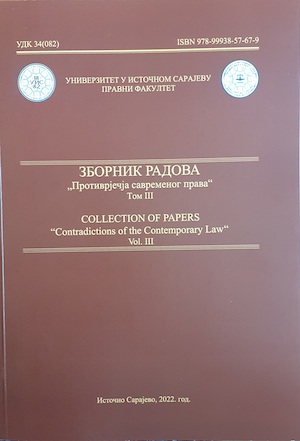Implementation and Benefits of the Multilateral Convention on Mutual Administrative Assistance in Tax Matters, With Reference to Bosnia and Herzegovina
Implementation and Benefits of the Multilateral Convention on Mutual Administrative Assistance in Tax Matters, With Reference to Bosnia and Herzegovina
Author(s): Bojana Vasiljević Poljašević
Subject(s): Law, Constitution, Jurisprudence, Fiscal Politics / Budgeting
Published by: Правни факултет Универзитета у Источном Сарајеву
Keywords: Multilateral Convention; Mutual Administrative Assistance; Tax; Tax matters;
Summary/Abstract: Greed and egoism are phenomena immanent to any society. It could also be said that since the early ages, there has also been a need to claim as much money, power and glory as possible. On the other hand, or side by side, is the need to reduce that amount of money, i.e. wealth, as small or less as possible through different types of taxation.It could be even said that greed, money and selfish own goals have become a top priority in the life and work of most legal and natural persons, especially large multinational companies, and a very wealthy and/or politically powerful citizens around the world.In addition, to the last aforementioned activities of legal and natural persons focused primarily on increasing their own power and wealth, and on the other hand focused on paying as little tax as possible or not paying taxes at all, tax competition among different tax jurisdictions happened. States, i.e. jurisdictions have embarked on a strong struggle to attract foreign capital by applying various measures, primarily by introducing various tax reliefs, tax exemptions, introducing simulative tax rates or non-taxation certain incomes at all, etc. Such practices, both by legal and natural persons, as well as by the states themselves, have led to the need to find a unique, global solution that would minimize or prevent the most pronounced tax evasion and tax avoidance, i.e. eliminate the negative effects of harmful tax competition.As one of the path in the light of solving the problems and developed jointly by the OECD and the Council of Europe in 1988 and amended by Protocol in 2010 was the Multilateral Convention on Mutual Administrative Assistance in Tax Matters. This Convention is the most comprehensive multilateral instrument available for all forms of tax co-operation to tackle tax evasion and avoidance that is priority in the whole world, i.e. priority in almost every country worldwide. So, why do we (world) need to have international cooperation and, more above, coordination in the area of taxation? What is the main purpose of this Convention? Why does it matters? What is Convention’s main goal and achievement so far? What benefits (and losses) can be expected by Bosnia and Herzegovina and its citizens from this Multilateral Convention on Mutual Administrative Assistance in Tax Matters Convention? What is the legal framework for the exchange of information in Bosnia and Herzegovina, which is very complex in terms of fiscal competencies and organization?The aim of this paper is to present the legal framework of Bosnia and Herzegovina for the exchange of tax information. Also, in this paper, author will point out the advantages and disadvantages that may occur in Bosnia and Herzegovina within the implementation of this Convention. Finally, the author will point out the need for changes in amendments to tax legislation, so that the Convention in Bosnia and Herzegovina could be applied in the most efficient way.
Book: Зборник радова "Противрјечја савременог права" Том III
- Page Range: 359-381
- Page Count: 23
- Publication Year: 2022
- Language: English
- Content File-PDF

